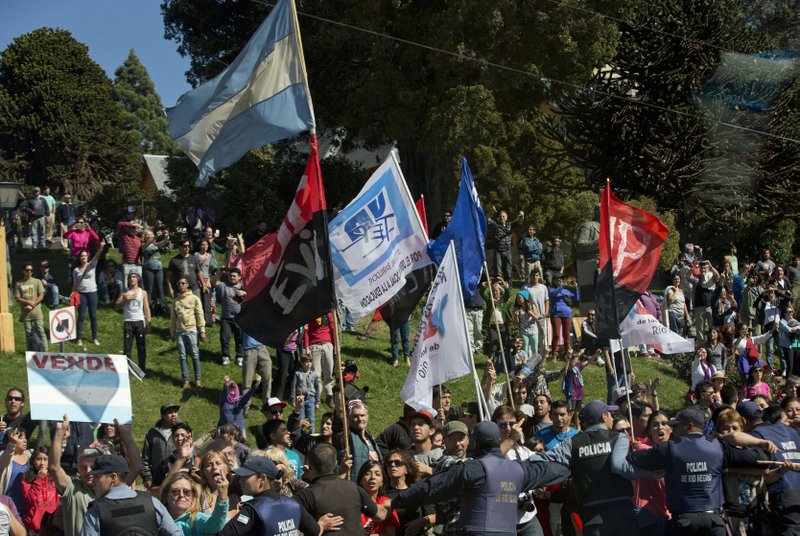BARILOCHE, Argentina -- Dancing the tango, relaxing with family in Patagonia, catching a baseball game with Cuba's Raul Castro -- it's been an unusual week for President Barack Obama.
His tour of Latin America left him on the periphery as the world grappled with terrorism and other problems. Republican critics faulted Obama for sticking to his itinerary even after more than 30 people were killed in an Islamic State-linked attack in Brussels. Obama insists he remained fully engaged.
"That was a tremendous mistake," Richard Haass, president of the Council on Foreign Relations, said Thursday on MSNBC. "It's fine to go to Argentina. You want to do the work, but you've got to be careful of these little photo-ops or optics. Baseball games and tangos, that's inconsistent with the seriousness of the day."
To drop everything and rush home every time attackers strike would be playing into extremists' hands, Obama said. It also would upend other critical business on the president's agenda, such as Obama's historic effort to normalize relations with Cuba and to improve U.S. ties to Argentina.
"That is how we are going to defeat these terrorist groups," Obama said in Buenos Aires. "A lot of it is also going to be to say, 'you do not have power over us. We are strong. Our values are right. You offer nothing except death.'"
Obama didn't initiate his brief tango Wednesday evening at a state dinner in his honor. In fact, he declined several invitations by the sashaying dancer before politely giving in.
And attending the exhibition game in Havana between Cuba's national team and Major League Baseball's Tampa Bay Rays was itself an act of diplomacy. As "The Star-Spangled Banner" rang out, there was a palpable sense that after more than half a century of estrangement, something new was foot.
Still, Obama faced no shortage of flak. Twitter and other social media sites were abuzz with digitally altered images of Obama tangoing superimposed over scenes of carnage.
"I think he ought to return home," said Ohio Gov. John Kasich, a GOP presidential candidate.
White House officials said Obama can do anything from the road that he can do from the White House, echoing an argument Obama has made frequently after other tragedies interrupted his travel. After Islamic State extremists attacked Paris last year, Obama went forward with a trip to Turkey and eastern Asia, and used his meetings there to coordinate with world leaders on ramping up the fight against the militant group.
Moreover, there was no indication that Obama's response would have been different had he been in Washington or traveled to Brussels.
Obama always travels with top domestic and national security advisers who keep him abreast of developments and coordinate his response. In Havana, he was briefed within hours of the Brussels attacks.
And even as he prepared for some leisure time with his wife and daughters in the Argentine city of Bariloche, where U.S. outlaws Butch Cassidy and the Sundance Kid once operated a ranch, Obama spoke by secure phone call with his counterterrorism adviser, Lisa Monaco. A White House official said he directed his team to "continue providing any and all requested assistance to Belgian and other authorities investigating the attack."
Revisiting the past
Focusing on the purpose of his trip to Argentina, Obama expressed regret Thursday for the failure of the United States to acknowledge the brutal repression and atrocities that took place during Argentina's "dirty war" in the 1970s and '80s.
"There's been controversy about the policies of the United States early in those dark days," Obama said at the Parque de la Memoria, a monument to the war's victims, where he attended a ceremony for the 40th anniversary of the 1976 military coup that began the Argentine dictatorship.
The United States "has to examine its own policies, as well, and its own past," Obama added. "We've been slow to speak out for human rights, and that was the case here."
The president's remarks came after he toured the memorial with President Mauricio Macri of Argentina, walking beside a hulking gray stone wall engraved with the names and ages of 20,000 victims -- plus 10,000 blank spaces for those who have yet to be identified.
Obama announced this week that he would begin a declassification effort to unseal secret military and intelligence files that could shed light on the fates of some of those victims, as well as what the United States knew about the human-rights violations that took place during what Macri called "the darkest period in our history."
The leaders walked together to a bridgehead overlooking the Rio de la Plata, where they each cast three white roses into the water to honor the victims.
"A memorial like this speaks to the responsibilities that all of us have," Obama said later. "We cannot forget the past, but when we find the courage to confront and we find the courage to change that past, that's when we build a better future."
Human-rights groups had reacted angrily to the timing of Obama's trip, arguing that it was inappropriate for him to visit at the very moment that Argentina was commemorating a tragic turn in its history that many believe was condoned, and in some cases enabled, by the United States.
Macri thanked Obama for participating in Argentina's somber day of remembrance, and said nations must not be "passive onlookers" of human rights violations, as had been the case in the past.
"This is a marvelous opportunity for all of the Argentine people to say together, 'Never again,'" Macri said. "Never again to institutional violence."
Information for this article was contributed by Josh Lederman of The Associated Press and by Julie Hirschfeld Davis of The New York Times.
A Section on 03/25/2016
